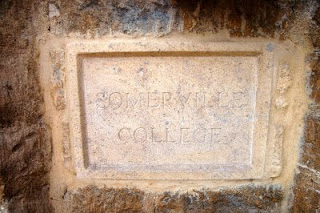Amongst the thousands of Alumna Somerville has produced since its inception, there can be seen a steady stream of writers who have gone on to win fame and inspire generations of readers.
It is, perhaps, worth remarking upon the fact that very few of them have chosen to portray the college in their fictional work. Dorothy L Sayers is well known for creating a thinly veiled Somerville in her ‘Gaudy Night’, but Vera Brittain also used the college in her first novel ‘The Dark Tide.’
During the war, Somerville’s buildings had been requisitioned by the War office and its students found themselves removed to a small corner of Oriel – although mat students (Brittain included) chose to suspend their studies in favour of assisting the war effort by nursing or other full time occupations. The return to post war Oxford was a shock to those who had been away, and tested by the experiences thrust upon them.
College life, with its formalities, must have seemed archaic and the world of The Dark Tide uses its first section to cast a piercing light on the lives of the returning post war undergraduates. There is a caustic tone to Brittain’s portrayal of college life; the students gathering in very cliquey sets, behaving in a way that does not reflect the empowerment that women achieved through the war, and Virginia (a character who reflects much of who Vera Brittain was at that time) finds it hard to accept their attitude, and eschews ‘fitting in’ in favour of hard work.
In a modern world, which is used to criticism and satire, it will perhaps surprise the reader to learn how much controversy the novel created. The powers that be, who recognised themselves in the pages of Brittain’s novel, did not find the portrayal flattering and were so outraged that they declared the book to be banned from the college. I am inclined to think that were an alumnae to fictionalise the college now (perhaps a humorous take on when we started admitting men) the reaction would be far more measured. Times have, of course, changed greatly, and perhaps the work was seen as belittling the achievements of women who had only so recently won the right to be awarded the degree for which they had studied.
Even at this early stage in her career, Vera Brittain clearly had a lot to say about the forces which drive a woman to make the choices that will shape her life. ‘The Dark Tide’s’ central characters are polar opposites who are eventually united by their share in a mistake that affects both their lives.
Brittain’s prose is not particularly poetic, choosing instead to tell the story in what might seem (to a modern reader) to be an unsympathetic tone. The First World War had a great effect on Brittain, as is evidenced in her other works and the direction her life took from then on, and it is plain that this effect is at work on her writing here.
I’m reluctant to end on a bleak note, and happily Vera Brittain’s own history gives us a ray of sunshine. However unhappy the novel is and whatever the opinion of her college, the book must have given some a glimpse of the real woman behind it, for – as Vera herself explains – her first ever fan mail was from a man who, after a year or so of courtship, became her husband. The rest, as they say, is history!
















